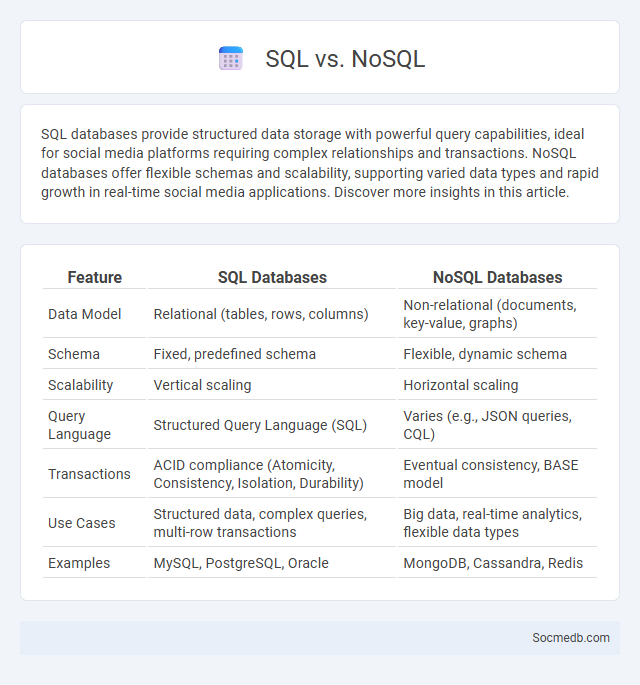
Photo illustration: SQL vs NoSQL
SQL databases provide structured data storage with powerful query capabilities, ideal for social media platforms requiring complex relationships and transactions. NoSQL databases offer flexible schemas and scalability, supporting varied data types and rapid growth in real-time social media applications. Discover more insights in this article.
Table of Comparison
| Feature | SQL Databases | NoSQL Databases |
|---|---|---|
| Data Model | Relational (tables, rows, columns) | Non-relational (documents, key-value, graphs) |
| Schema | Fixed, predefined schema | Flexible, dynamic schema |
| Scalability | Vertical scaling | Horizontal scaling |
| Query Language | Structured Query Language (SQL) | Varies (e.g., JSON queries, CQL) |
| Transactions | ACID compliance (Atomicity, Consistency, Isolation, Durability) | Eventual consistency, BASE model |
| Use Cases | Structured data, complex queries, multi-row transactions | Big data, real-time analytics, flexible data types |
| Examples | MySQL, PostgreSQL, Oracle | MongoDB, Cassandra, Redis |
Introduction to SQL and NoSQL
SQL databases organize data into structured tables using predefined schemas, making them ideal for social media platforms that require complex queries and transactional consistency to manage user profiles, posts, and interactions. NoSQL databases store data in flexible, scalable formats like key-value pairs, documents, or graphs, supporting high-volume, unstructured social media data such as multimedia content, user preferences, and real-time feeds. Understanding SQL and NoSQL helps you choose the right database technology to efficiently handle diverse data types and scale your social media applications.
Key Differences Between SQL and NoSQL
SQL databases use structured query language and have a predefined schema, making them ideal for applications requiring complex queries and transactional integrity, such as social media platforms managing user data and relationships. NoSQL databases offer flexible schemas and can handle unstructured data, supporting scalable, high-throughput environments like social media feeds, comments, and real-time updates. Key differences lie in their data models, scalability, and consistency mechanisms, with SQL favoring vertical scaling and strong consistency, while NoSQL enables horizontal scaling and eventual consistency.
Popular SQL Databases: Features and Use Cases
Popular SQL databases like MySQL, PostgreSQL, and Microsoft SQL Server offer robust data management features essential for social media platforms. MySQL provides high-speed data processing and scalability, ideal for managing user interactions and content delivery. PostgreSQL's advanced indexing and support for complex queries enable effective handling of large datasets and real-time analytics, while Microsoft SQL Server excels in integration with enterprise tools, making it suitable for securing social media user data and supporting multi-dimensional reporting.
Leading NoSQL Databases: Types and Applications
Leading NoSQL databases such as MongoDB, Cassandra, and Redis play a critical role in managing social media data characterized by high volume, velocity, and variety. MongoDB's flexible document model supports user-generated content, while Cassandra ensures scalability and fault tolerance for real-time interactions and analytics. Choosing the right NoSQL database optimizes your social media platform's performance, enabling efficient handling of diverse data types and seamless user experiences.
When to Choose SQL vs NoSQL
When managing social media data, choose SQL databases for structured data and complex queries involving user profiles, relationships, and transactions that demand ACID compliance. NoSQL databases excel with unstructured and semi-structured data such as posts, comments, and multimedia content, offering scalability and flexibility for rapidly changing data formats. Your decision to use SQL or NoSQL should align with data consistency needs, query complexity, and real-time performance requirements.
Essential SQL Skills for Database Professionals
Mastering essential SQL skills is crucial for database professionals to efficiently manage and manipulate social media data. Proficiency in querying, joining multiple tables, and optimizing database performance enables accurate analysis of user interactions, trends, and content engagement. Understanding advanced SQL techniques such as indexing, stored procedures, and data normalization ensures scalable social media database management and real-time analytics.
Core NoSQL Skills and Competencies
Mastering Core NoSQL skills such as data modeling, indexing, and query optimization is essential for managing large-scale social media datasets efficiently. Your ability to design flexible, schema-less databases like MongoDB or Cassandra ensures real-time data retrieval and seamless user experience. Proficiency in distributed computing and data replication further enhances scalability and reliability in dynamic social media platforms.
Methods for Assessing SQL Database Skills
Effective methods for assessing SQL database skills include practical coding tests that require you to write complex queries, use joins, and optimize database performance. Reviewing real-world projects or case studies can demonstrate your ability to manage and analyze data within various database structures. Structured interviews focusing on problem-solving scenarios and database normalization principles further validate your expertise.
Effective Techniques for NoSQL Skills Assessment
Effective techniques for NoSQL skills assessment include practical coding tests that evaluate the ability to design and query databases like MongoDB, Cassandra, or Redis, reflecting real-world data scenarios. Incorporating project-based evaluations helps measure candidates' proficiency in handling unstructured data, schema design, and performance optimization in distributed databases. Leveraging interactive platforms and scenario-driven questions ensures comprehensive assessment of both theoretical knowledge and practical skills in NoSQL technologies.
Future Trends in Database Technologies and Skill Requirements
Emerging social media platforms require advanced database technologies such as graph databases and real-time data processing to manage complex user interactions and massive data volumes efficiently. Your future skills must include expertise in distributed databases, machine learning for data analysis, and proficiency in cloud-based storage solutions to stay competitive. Adapting to these cutting-edge technologies will enable optimized data handling and improved user engagement in social media environments.
 socmedb.com
socmedb.com